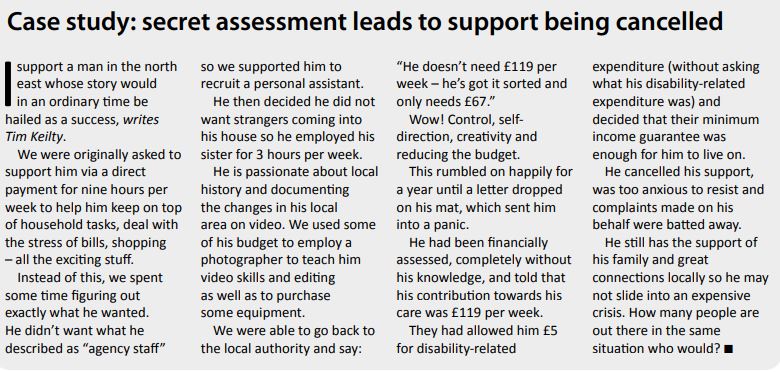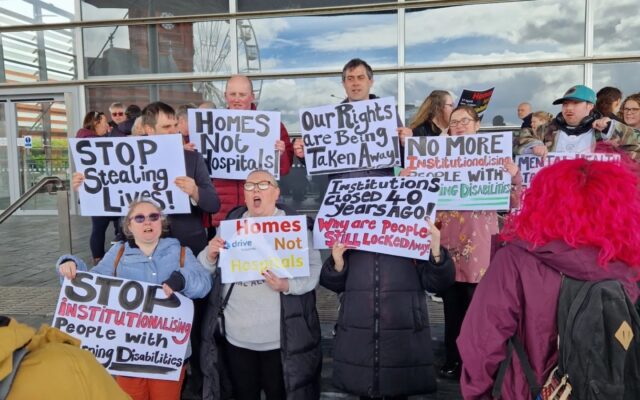No idea how much they’ve got, not much control over what they spend it on but supported by people to make a budget plan. When you are not in control, anyone can assume that control and they do, writes Tim Keilty.
The original idea for this article was a discussion around the concept of money and control, exploring the everyday lack of control people with a learning disability experience on money matters and money as a quality of life issue. This covers issues from money in hand to care charges and the role of appointees and deputies. Then we were overtaken by events. A growing movement of people became angry, dismayed and galvanised by the injustice of care charges. A court ruling that Norfolk County Council was overcharging many people with disabilities for their care (Tackling unfair charging issues, summer 2021) starkly set out the discrimination at the heart of charging policy and galvanised people well beyond Norfolk.
Stories emerged of personal independence payments being immediately swallowed up by local authorities to pay for care and of financial assessments being carried out by councils without even speaking to the person. Some of this went on under the cloud of Covid. There were stories of people cancelling their support because they ended up having to pay for it all. People were pushed into genuine hardship and poverty by the state, local and national. These stories have had huge personal costs (see case study opposite).
Perfect storm
People really are caught in a perfect storm – support being cut, withdrawn or denied from the outset, benefits being frozen and, if you do get support, you pay higher charges for reduced services out of a smaller personal pot. It’s such a perfect storm that you would almost think it was designed that way. I feel like a fraud writing this. I fully intended to play a major coordinating part in a new campaign but, thankfully, there were already people much more committed and organised ready to do it.
For a couple of months, I’d been part of Zoom conversations with Sally Warren from Paradigm, Sue Deeley and Julie Smith from Getta Life, family carer Liz Wilson and Sue Livett of the Aldingbourne Trust. It felt as if these clandestine Zoom meetings were happening all over the country.
Sally Warren of Paradigm, joined by Katie Clarke, enlisted the help of In Control and Be Human and the first of a series of much bigger Zoom conversations ensued.
The kick-off conversation
Sally and I have known each other for many years. I had heard she too had been listening to stories from disabled people, writes Katie Clarke.
We decided we needed to get in touch with our friends at In Control as there was a real need to bring people together. We needed to join the many dots and show support to those who were individually campaigning and challenging. We had to connect with the disability-led organisations around the country who had already taken on these issues and who as parents we could learn from. We also had to learn from the giants on whose shoulders we stand, such as those in Inclusion London, Disabled People Against the Cuts and many more.
If you are on benefits and have enough in the bank but have to keep spending to stay under a threshold of savings so your payments aren’t cut, how does that happen and what does that say about life? Tim Keilty will examine this in a future issue
Don’t feel isolated – get involved
Any families or individuals in this situation – you are not on your own. Others are going through this and there are ways to keep in touch:
- Facebook: Giselle Hoad has set up a group called Adult Social Care Warriors: https://tinyurl.com/4v3dc3h4
- Fill in the Social Care Futures ‘Charges for social care and cuts to provision during the coronavirus pandemic?’ survey if you haven’t already: https://tinyurl.com/94r3y6ar
- Follow the campaign on Twitter: https://twitter.com/JrMonitoring
- Sign up to Inclusion London’s campaign, Scrap Social Care Charging: https://tinyurl.com/3dxsbscx and follow In Control (https://in-control.org.uk/) for updates.
There is a groundswell of local action – get organised, talk, collaborate, campaign. If you want to get updates via email, contact katie@bringingustogether.org.uk who will add you to the ever-growing list.
Katie Clarke is a parent of six children in their 20s. She has been working to make a difference, and listening to parents’ and disabled people’s stories for more than 25 years. She has set up many projects and organisations and continues to work at both grassroots and strategic levels; Tim Keilty works for New Prospects Association in the north east. He is a fellow of the Centre for Welfare Reform and a paid supporter representative for Learning Disability England
Further reading
Duffy S (2014) Counting the Cuts. Centre for Welfare Reform. https://tinyurl.com/a8zzaazy
Shameful cost hikes brought in under cloudy rules
We were facing the unknown during the first month in lockdown. Many of us had stopped having personal assistants coming into the home, writes Katie Clarke. We felt flooded with the amount of guidance coming out, and fear over the frailty score that affected many of us and put disabled people into the vulnerable category. We were swamped with news briefings and the daily death count.
We were facing the unknown during the first month in lockdown. Many of us had stopped having personal assistants coming into the home, writes Katie Clarke. We felt flooded with the amount of guidance coming out, and fear over the frailty score that affected many of us and put disabled people into the vulnerable category. We were swamped with news briefings and the daily death count.
We had little further contact with social services until 3 February this year when into my daughter’s email inbox came a harshly worded email from the adult social care charging team, saying she was due to pay an rise in charges from £15 a week to £68. A 400% increase. It was poor social care practice and showed few if any social care values.
I was appalled by what I felt was immoral, unfair and unethical so I posted on Facebook and received around 100 comments. I got a similar number on our Bringing Us Together Facebook group. I couldn’t believe this was happening around the country. Comments included:
“Our situation is different as residential care but he has all but £25/week of his universal credit taken from him by the local authority.”
“I just want to say that we all understand that adult social care is seriously undervalued and underfunded, we know LAs are struggling with their budgets, BUT it should not be down to the people that need the service to fund it! People have a fundamental human right to enjoy their possessions and that includes their money. They have already been assessed as needing those benefits/ funds and it shouldn’t be taken off them! Shame on you local authorities!”
“In essence, there is no transparency, rhyme or reason how each sum is calculated. It does appear that, sadly, the more support required, the more you pay. Are they blaming a human being for having a disability?”
“It seems when young people go onto PIP [personal independence payments] the LA are increasing charges one parent said by £79 per week.”
We heard stories of people giving up their care as they were unable to afford to feed themselves. The comments kept coming. This is a time for not being invisible, for us all to be supporting one another, sharing information which is power, sharing campaigns from areas and organisations via social media and for us to get the message out that we are stronger together. Enough is enough.
People we speak to in local authorities do not want to do this. They are faced with unprecedented cuts by central government – but they are playing along. Each council has its own cloudy rules, often wildly different from those of the one next door. Here’s a little story about how surreal it all is. Mary Smith (not her real name) is challenging her care charge and has collected evidence of her disability-related expenditure. She needs to use a particular brand of wipes and shower gel for her personal care.
A panel of senior managers in her local authority meet to discuss, among other things, her care charge challenge. They decide the wipes are a disability-related expenditure, but the shower gel isn’t.






